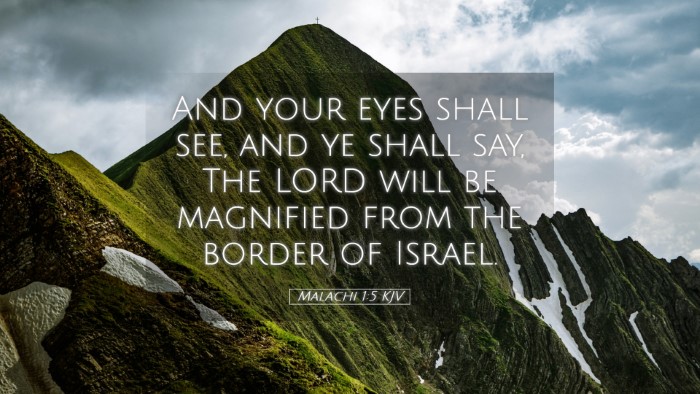Old Testament
Genesis Exodus Leviticus Numbers Deuteronomy Joshua Judges Ruth 1 Samuel 2 Samuel 1 Kings 2 Kings 1 Chronicles 2 Chronicles Ezra Nehemiah Esther Job Psalms Proverbs Ecclesiastes Song of Solomon Isaiah Jeremiah Lamentations Ezekiel Daniel Hosea Joel Amos Obadiah Jonah Micah Nahum Habakkuk Zephaniah Haggai Zechariah MalachiMalachi 1:5
Malachi 1:5 KJV
And your eyes shall see, and ye shall say, The LORD will be magnified from the border of Israel.
Malachi 1:5 Bible Commentary
Commentary on Malachi 1:5
Malachi 1:5 states: "And your eyes shall see, and ye shall say, The Lord will be magnified from the border of Israel." This verse encapsulates profound themes regarding God's sovereignty, the people's recognition of divine majesty, and the covenant relationship between God and Israel. Below is a synthesis of insights based on classic public domain commentaries.
Understanding the Context
The book of Malachi is a pivotal text in the Minor Prophets, likely composed during the post-exilic period when the Israelites returned from Babylonian captivity. It speaks directly to the spiritual apathy and moral decline of the people. Malachi, whose name means "my messenger," serves as an intermediary between God and His people, delivering messages of correction and encouragement.
Divine Magnification
According to Matthew Henry, the phrase "The Lord will be magnified" signifies the acknowledgment of God’s greatness and glory. The intended audience is encouraged to reassess their views and appreciate the divine sovereignty that governs all creation. Henry also posits that this acknowledgment would elicit a response from the people to return to proper worship and reverence.
Albert Barnes notes that God's magnification is tied to His holiness and justice. The recognition of God's attributes inspires fear and reverence among the people. This theme counters the distorted view that God is indifferent to their corrupt practices. God desires His people to see Him rightly - as the sovereign ruler who must be honored and revered.
The People's Response
The text emphasizes that the people will "see" and "say." Adam Clarke explains that this seeing is both a physical and spiritual awakening. The people's acknowledgment of God's greatness is critical for their restoration. Clarke elucidates that this manifestation of divine power and justice would be evident even to those at the furthest borders of Israel, indicating that God's glory transcends geographical boundaries.
- Spiritual Awakening: The call for recognition serves as an invitation for spiritual renewal.
- Public Witness: The prophetic voice emphasizes a collective witness to God's actions, prompting community confession and unity.
Implications for Today
For modern readers, particularly pastors and scholars, Malachi 1:5 holds significant implications. It challenges the contemporary church to reflect on how the glory and holiness of God are perceived and acknowledged in worship and daily life. Henry's insights urge believers to examine their worship practices, ensuring that they magnify God's name by living lives of holiness and integrity.
The Role of Witness
The communal aspect of recognizing God's majesty reinforces the importance of a collective witness in contemporary faith communities. As noted by Barnes, the acknowledgment of God's majesty encourages believers to testify to His nature and deeds, thus fulfilling the Great Commission by proclaiming the Lord's glories from the borders to the nations.
Conclusion
In summary, Malachi 1:5 serves as a powerful reminder of God's sovereignty and the call for His people to recognize and magnify Him. The text resonates with timeless truths that encourage believers to worship sincerely and live in a way that reflects God's greatness. The insights from Matthew Henry, Albert Barnes, and Adam Clarke collectively challenge us to embrace God's leadership and to testify of His works to the world.
Let us, therefore, strive to reflect His glory and not allow the apathy that characterized Israel to define our own walks of faith.


